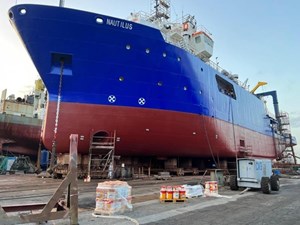TDI-Brooks increases subsea vessel capacity with R/V NAUTILUS
(WO) – TDI-Brooks increases its vessel capacity by adding a 75-meter DP2 vessel, R/V NAUTILUS (formerly Nautical Geo), to its fleet. The market for subsea services remains strong, coupled with increased demand from clients and the need for increased capabilities. The vessel can potentially offer a variety of offshore assistance with subsea services, construction aid, exploration, production, ROV and diving support, and scientific marine research and survey mapping.
This vessel is currently about 60% through its retrofit period in Las Palmas. It will finish its shipyard period in late September and then transit to Trinidad for several geotechnical coring projects. One of these programs will involve spud can analyses utilizing the recently delivered Manta-200, deployed through the NAUTILUS mid-ship moonpool. TDI-Brooks continues to focus on the growing offshore wind market along with other scientific survey programs.
The NAUTILUS is a versatile vessel with one North American MCK-1240 upper forecastle deck STBD side SWL 7.1 ton crane, large accommodation (46 berths) and deck capacity. The vessel will be outfitted with TDI-Brooks’ complete geotechnical tool kit including a suite of innovative geotechnical tools for soil sampling and measurement.
These include 0.5 and 1 meter box corers (BC), 6 and 9 meter piston corers (PC), 20 meter jumbo piston corers (JPC), cyclic t-bar instrument (TBAR), piezocone penetrometers including a 40 meter CPT-Stinger and 10 meter Gravity CPT tool (gCPT), newly acquired Geomil Manta-200 CPT, Neptune 3K & 5K vibracorers and TDI-Brooks’ designed pneumatic vibracorer. The Nautilus will have a Teledyne RESON full ocean depth multibeam echosounder (MBES) for surveys to approximately 2,500 m water depth for performing hydrographic marine, surface geochemical “seep-hunting” (SGE) and seabed heatflow surveys (HF).
The NAUTILUS will be operated within a robust Safety Management System, whereas all of TDI’s vessels are regularly vetted by client marine assurance groups and are a part of the OCIMF Offshore Vessel Inspection Database (OVID).



